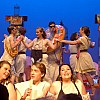La Belle Hélène, Jacques Offenbach
| Oorspronkelijke titel | La Belle Hélène |
| Nederlandse titel | De schone Helena |
| Componist | Jacques Offenbach |
| Tekstdichter | Henri Meilhac en Ludovic Halévy |
| Vertaling | Joop C.G. Fransen |
| Genre | Opéra-bouffe (komische opera) in drie bedrijven |
| Première | 17 december 1864, Parijs, Théâtre des Variétés. |
| Tijd van handeling | Griekse oudheid (met een knipoog naar de moderne tijd) |
| Plaats van handeling |
|
| Belangrijkste rollen |
|
| Kooraandeel | Zeer veel koor |
| Orkestbezetting | 2 fluiten, 1 hobo, 2 klarinetten, 1 fagot, 2 hoorns, 2 trompetten, 1 trombone, pauken/slagwerk, strijkers |
| Bijzondere eisen |
Gebruikelijk is om de raadselwedstrijd in het eerste bedrijf aan de actualiteit te koppelen, dit vereist inventiviteit van de regisseur. Voor de rol van Paris moet de tenor een hoge bes kunnen zingen. Een valsspelend bühneorkestje is voorgeschreven. Hélène moet het liefst de vaardigheid van een cabaretière hebben |
| Partituur en orkestmateriaal | Leverbaar |
| Moeilijkheidsgraad | Niet echt moeilijk |
| Duur | Drie bedrijven, totale duur: ongeveer 2½ uur |
| Muziek |
Een van de meest gespeelde Offenbach-werken. Bekende melodieën, zoals de entree van de Griekse helden, de aria van Paris, de beroemde wals, een mannentrio (parodie op Wilhelm Tell van Rossini) enz. |
| Verhaal |
Venus heeft aan Paris de schoonste vrouw ter wereld beloofd. Dit blijkt Helena te zijn. Ongelukkigerwijze is deze dame al getrouwd, met de koning van Sparta. Na veel verwikkelingen weet Paris de schone Helena te ontvoeren. Het verhaal is een parodie op de hoogdravende opera seria. De hogepriester Calchas en de Griekse helden Ajax I, Ajax II, Agamemnon, Menelaus en Achilles zijn bij Offenbach karikaturen: ijdel, jaloers, gierig enz. Het stuk zit vol komisch werkende anachronismen |
| Kostumering | Quasi-Grieks, met verwijzingen naar de moderne tijd |
| Opmerking | |
| Foto's |   
|
| Link | Wikipedia |
< Les Bavards | Volg | Der Bettelstudent >

